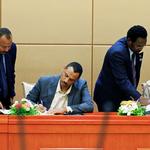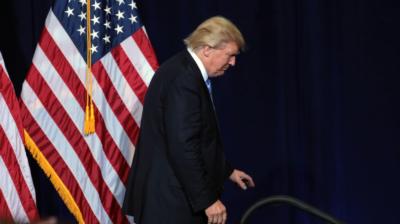Bashir is in jail, but where are the Sudanese Islamists?
Rumours started spreading in Khartoum two years ago: Bashir was working to dissolve the Islamic Movement in Sudan. He had severed relations with Iran and decided to scale down his dealings with Qatar in favour of getting closer to Saudi Arabia and UAE, and at the same time reached out to Egypt by handing over some Egyptian Muslim brothers who had sought sanctuary in Sudan.
Anticipating a showdown
It was also rumored that Bashir’s decision to dissolve the Islamic Movement would be followed by another decision: To dismantle the Popular Defense Forces (PDF), a paramilitary group that was created by the Islamists. The early months of 2018 were rife with speculations that a confrontation between Bashir and the Islamists who brought him to power would be inevitable, much like what happened with Numeiri and the Communists in 1971.
It was speculated that the showdown between Bashir and the Islamists would be bloody. But things took a different turn. Bashir’s Chief of Staff, General Taha Osman El-Hussein, a Saudi Sudanese with dual citizenship, became a central person in the conflict between Bashir and the Islamists. He shielded Bashir from senior Islamist leaders, thus making it impossible for them to have any direct contact with the President. This widened the already existing cracks between the two former allies; President Bashir and the Islamists. The efforts to sideline the Islamists were orchestrated by the Saudis through Taha Osman El-Hussein. His role has been hard to digest for many Sudanese, who see him as a traitor and hold grudge against Bashir for putting him in such a powerful position.
A surprising turn of events
But Bashir did not dissolve the Islamic Movement as expected. Instead, there was a dramatic turn of events: The Islamists succeeded in convincing Bashir to fire his Chief of Staff. Rumour had it that Taha El-Hussein was conspiring with the Saudis and UAE leaders to overthrow the ruling family in Qatar. While such allegations were not corroborated, Taha was sacked and had to leave to Saudi Arabia where he has been living ever since. The Sudanese people were surprised that he was never put on trial.
By late 2017, Bashir felt that Saudi Arabia and UAE had let him down, as the two countries did not provide the economic support he anticipated in return for continuing to send troops to Yemen. It should come as no surprise that Bashir, feeling let down by Saudi Arabia and UAE, turned to his former allies, Qatar and Turkey. As a gesture Bashir gave Turkey agricultural land in the form of an entire island in the Red Sea. Eventually, the Turkish President, Recep Teyyep Erdogan, visited Sudan. Bashir also visited Turkey twice in less than a year; in 2017 and 2018.
The sacking of Bashir’s Chief of Staff is said to have been orchestrated by Turkey and Qatar. Shortly after Taha left the Presidential Place, Bashir allowed the Islamic Movement to resume its work. Bashir even attended the Movement’s general assembly in one of Khartoum’s suburbs. Also the Popular Defense Forces resumed their regular activities and organized its annual festivals where jihadi songs and lyrics are performed. Bashir then got support from both the Islamic Movement and the Popular Defense Forces to run for the 2020 elections. He was also supported by the Popular Congress Party (PCP), and other small political parties that were part of the National Dialogue; including those of Gazi Salaheldin and El-Tayeb Mustafa.
Changing the dynamics of the game
Bashir’s move, turning to former allies in late 2017, halted the confrontation between him and the Islamic Movement and changed the dynamics of the game. Since the fallout between Bashir and Hassan al-Turabi (former leader of the National Islamic Front, later the Popular Congress Party) in 1999, the former succeeded to make the Presidency an empire around which he gathered his loyalists.
But the most significant move Bashir did was to bring Salah Gosh back as the head of National Intelligence and Security Services (NISS). Bashir also made significant changes in the top brass of the Sudanese military; promoting the current head of Sudan’s Sovereign Council, General Abdelfatah Al-Burhan, to the position of the army’s Chief of Staff.
When the riots started in December, Bashir was already very unpopular and was seen by the public as the man behind their misery. Pressured by the protesters, Bashir was forced to step down as National Congress Party (NCP) chairman. Ahmed Haroum, a man indicted by the International Criminal Court (ICC), was brought in to fill his position. But just a week before he was ousted, Bashir went back and headed an NCP meeting where he apparently ordered security forces to crush the protesters at all costs while his chief spy, Salah Gosh, was busy rounding up businessmen who were accused of sabotaging Bashir.
Tumultuous transition
Bashir’s security committee decided that he should leave office. On 11 April Bashir was put under house arrest, but the military council that took over fooled no one. It was simply an elongation of Bashir’s rule. On 12 April, General Ibn Ouf and his deputy, General Kamal Abdelmaarouf, Chairman of Joint Chiefs of Staff, were forced to resign and general Abdelfatah Al-Burham took over as head of the Transitional Military Council (TMC).
The new military council also came under fire, as three of its members were Islamists. These three members were eventually forced to resign, but in the meantime general Hemedti, the commander of the Rapid Support Forces (RSF) – another notorious paramilitary force created by Bashir to fight rebel movements and protect him- entrenched his powers as his forces were in control of Khartoum and all the military installations and divisions.
So where are the Islamists?
Long before the rumours about Bashir’s intention to dissolve the Islamic movement, it had already been dormant for a while. The movement had postponed its general assembly, which was scheduled to take place in 2017. The rift between President Bashir and Hassan al-Turabi (leader of the National Islamic Front, later the Popular Congress Party) in 1999 and allegations of corruption against members of the Islamic Movement who held senior government offices had weakened the movement.
But despite this, and the changed power dynamics in the country during the past months, the Islamists still exist. The National Congress Party’s offices are now controlled by the authorities, but the party still operates although in a clandestine manner and by issuing sporadic and hesitant statements. Bashir and more than 20 NCP leaders are in jail waiting for their trials, but many others are at large and may cause problems for the transition. According to the Transitional Military Council, five coup attempts have been foiled. The last and most serious one was orchestrated by the army’s Chairman of the Joint Chiefs of Staff, a stark Islamist. During the interrogation, he confessed that he has been loyal to the Islamic Movement ever since he was a junior officer. The Islamists still control the civil service and the business community, and still have a presence in the security sector.
Bashir may be gone, but the structures he created are still there. Yet, the Islamists face a serious challenge: They lost social support and sympathy. Ordinary people see them as corrupt thieves. Their political future is gloomy.
This Sudan blog post is written by Munzoul Assal, professor of social anthropology and director of the Peace Research Institute at the University of Khartoum. He is a partner in the ARUS programme.





